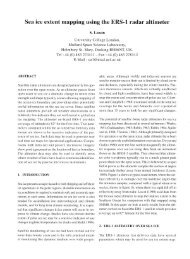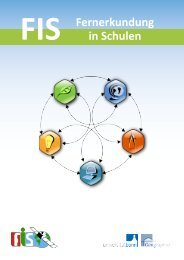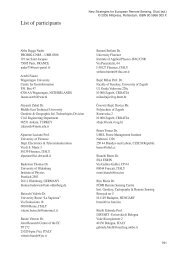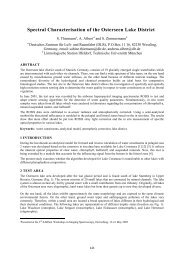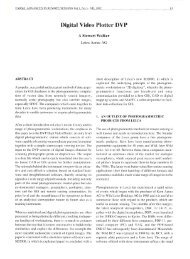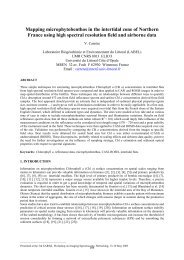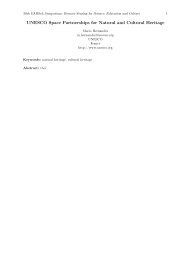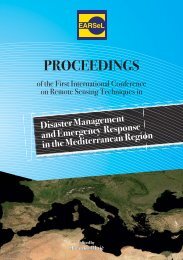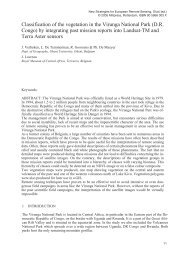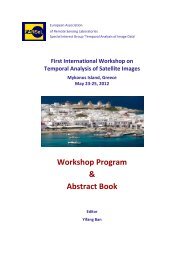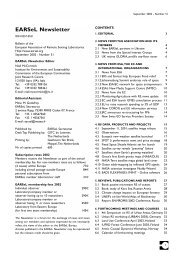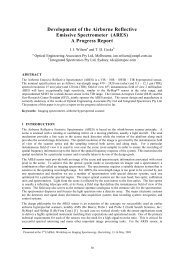7th Workshop on Forest Fire Management - EARSeL, European ...
7th Workshop on Forest Fire Management - EARSeL, European ...
7th Workshop on Forest Fire Management - EARSeL, European ...
Create successful ePaper yourself
Turn your PDF publications into a flip-book with our unique Google optimized e-Paper software.
224<br />
IV - BURNED LAND MAPPING, FIRE SEVERITY DETERMINATION, AND VEGETATION RECOVERY ASSESSMENT<br />
high correlati<strong>on</strong> (R 2 =0.845) between observed and simulated GeoCBI and<br />
an almost 1:1 linear fitting (slope ~1 and c<strong>on</strong>stant ~0) as well as a very<br />
low dispersi<strong>on</strong> of the values. The total RMSE was also very low (RMSE=<br />
0.14). In additi<strong>on</strong>, the accuracy was quite homogeneous throughout the<br />
range of GeoCBI values observed in the field (1.68 to 3.00). For the validati<strong>on</strong><br />
of BE estimati<strong>on</strong>, the results of the linear fitting between dNDVI and<br />
both BEref and BEadj (table 3) showed that the correlati<strong>on</strong> coefficients<br />
were c<strong>on</strong>siderably higher in the case of BEadj, ranging from 0.45 (shrubs)<br />
to 0.72 (hardwoods). In the case of BE, the correlati<strong>on</strong> was practically inexistent<br />
(table 3) for all vegetati<strong>on</strong> types.<br />
4 - Discussi<strong>on</strong> and c<strong>on</strong>clusi<strong>on</strong>s<br />
The simulati<strong>on</strong> model selected for this study had already been successfully<br />
applied in other Mediterranean fires in Spain and Portugal (De Santis et al.,<br />
2009). Validati<strong>on</strong> results showed that the accuracy of the model inversi<strong>on</strong><br />
was c<strong>on</strong>siderably homogeneous in all ranges of GeoCBI values, and the<br />
RMSE = 0.14 was, in fact, slightly lower than the <strong>on</strong>es obtained in Spain<br />
and Portugal (RMSE = 0.18-0.21). In additi<strong>on</strong>, the model was tested over a<br />
wider range of GeoCBI values. The results c<strong>on</strong>firmed the c<strong>on</strong>sistency of the<br />
model, which was independent of specific site characteristics, at least within<br />
Mediterranean/temperate envir<strong>on</strong>ments. The BE validati<strong>on</strong> c<strong>on</strong>firmed<br />
that the use of GeoCBI as an adjustment factor improved BE estimati<strong>on</strong><br />
c<strong>on</strong>siderably for all vegetati<strong>on</strong> types analyzed. From a broader perspective,<br />
this study must be regarded as a first attempt to improve BE estimati<strong>on</strong>.<br />
The fundamental improvements shown in BE estimati<strong>on</strong> still lies <strong>on</strong> the<br />
high accuracy of BS estimati<strong>on</strong>. Therefore, there is room for improvement,<br />
especially c<strong>on</strong>cerning alternative ways of optimizing the use of BS to adjust<br />
BE estimati<strong>on</strong>.<br />
References<br />
Barbosa, P.M., Cardoso Pereira, J.M., and Gregoire, J.-M., 1998.<br />
Compositing criteria for burned area assessment using multitemporal<br />
low resoluti<strong>on</strong> satellite data. Remote Sens. Envir<strong>on</strong>. 65, 38-49.<br />
Crutzen, P. and Andreae, M., 1990. Biomass burning in the tropics: Impact<br />
<strong>on</strong> atmospheric chemistry and biogeochemical cycles, Science, 250,<br />
1669-1678.<br />
De Santis, A., Chuvieco, E. & Vaughan, P.J., 2009. Short-term assessment<br />
of burn severity using the inversi<strong>on</strong> of PROSPECT and GeoSail models.<br />
Remote Sensing of Envir<strong>on</strong>ment, 113 (1), 126-136.<br />
De Santis, A. & Chuvieco, E., 2009. GeoCBI: a modified versi<strong>on</strong> of the<br />
Composite Burn Index for the initial assessment of the short-term burn<br />
severity from remotely sensed data. Remote Sensing of Envir<strong>on</strong>ment, 113



